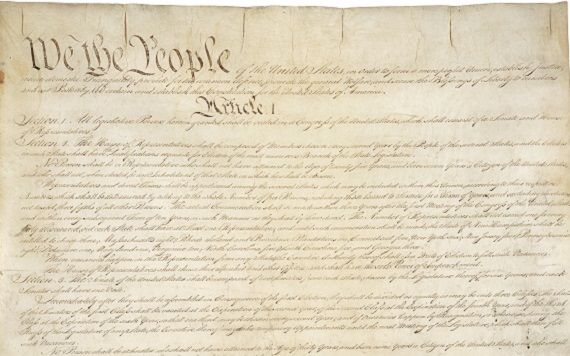On September 9th a federal court ordered Texas Gov. Greg Abbott to remove a 1,000-foot line of buoys from the Rio Grande. The buoys are part of Operation Lone Star—a Texas initiative to secure the state’s southern border, stop the smuggling of drugs and contraband, and interdict transnational criminal activity. Although the judge’s opinion was based on the obscure Rivers and Harbors Appropriation Act of 1899, it raises the issue of state authority over immigration.
The Biden administration favors an open southern border, and in 2022, according to Customs and Border Protection data, 2.76 million aliens entered the United States contrary to law. Some estimates indicate that illegal immigration costs Texas taxpayers over $13 billion per year. Understandably, Gov. Abbott seeks to return order and fiscal sanity to the southern border with various state initiatives such as the buoy line.
The big question is whether the states have any role in immigration policy. The district judge considering the buoy matter said “no” and pointed to the Constitution’s Naturalization Clause as “a textually demonstrable constitutional commitment of immigration to the [federal] legislative branch.” This is commonsensical, right? After all, don’t we have a federal agency dedicated to immigration and border enforcement?
When examining Congress’s enumerated powers, there is no mention of a power over immigration. Congress has the authority “[t]o establish an uniform Rule of Naturalization,” but that’s it. According to Professor Ilya Somin of the Antonin Scalia Law School, “The doctrine that Congress has broad ‘plenary’ power over immigration is . . . rarely questioned. But it is actually an emperor walking around without clothes, or at least far more scantily clad than most assume.”
The Naturalization Clause was included in the Constitution to remedy a defect in the Articles of Confederation whereby aliens could seek naturalization in a state with a liberal naturalization policy and then later move to a state with more rigid restrictions and still enjoy rights of naturalized citizens. A uniform system of naturalization was needed.
There is nothing in the debates at the Philadelphia Convention equating naturalization with immigration. The power to determine who is eligible to become a naturalized citizen is not the same thing as the power to determine who may cross a state border.
A distinction between naturalization and immigration might sound odd to modern ears, but both James Madison and Thomas Jefferson in the late 1790s argued that certain congressional statutes touching on immigration were unconstitutional infringements on state power. For example, the Alien Friends Act of 1798 permitted the president to expel all aliens that he deemed dangerous to the peace and safety of the United States. An alien who was expelled and who later returned to the United States could be imprisoned by the president for an indeterminate period.
In his Kentucky Resolution of 1798, Jefferson declared the Alien Friends Act void on the grounds “that alien friends are under the jurisdiction and protection of the laws of the State wherein they are; and that no power over them has been delegated to the United States.” Madison concurred with Jefferson. He believed alien friends to be under state law and subject to punishment only in the state where they resided.
Americans should revisit the constitutional theory of these two giants as we contemplate our current immigration fiasco and Gov. Abbott’s efforts. We have assumed Congress has the constitutional authority to regulate immigration, but this assumption is working to our detriment.
Recent polling shows that the American people are concerned about the level of legal and illegal immigration. The current open-borders policy promises a massive demographic and cultural shift. In the age of terrorism, it is also a convenient way for our enemies to easily cross into the United States and plan attacks. Moreover, as working-class Americans struggle to survive economically, the flood of cheap (and illegal) labor into the country only dims their economic prospects.
If the federal government will not undertake reasonable measures in the realm of immigration, the states should. Jefferson and Madison would no doubt endorse Gov. Abbott’s approach.







I completely concur with the lack of constitutional authorization for any federal control over immigration and that any such control is thus under the purview of the individual states. However, I don’t believe that “working-class Americans struggle to survive economically” has any source in their competition with immigrants; legal or ‘illegal’ (sic). The primary cause of this is unequivocally due to the government parasitism through taxation and regulatory interference in the economy; an economy that has been perverted and crippled through the profligate and irresponsible excess spending of the aggressive imperial war-mongering State ruled by criminals for the benefit of criminals. Pointing fingers at one of the consequences does nothing but shield the actual cause of the problem.
“Pointing fingers at one of the consequences does nothing but shield the actual cause of the problem.”
Exactly why they do so!
Point of order; “excess spending” equals DEBT. The Fed doesn’t “print” the debt…it is borrowed into existence. Someone has to pay the interest on the debt…that someone is your and your descendants.
It’s not too difficult to imagine that someone who is desperate for work and is accustomed to a lower standard of living will take lower pay, putting downward pressure on wages. I understand that this dynamic is even more extreme in Canada, where Indians can be seen in long lines just to apply for a simple, low paying job.
Didn’t Thomas Jefferson despise the Alien Act because it usurped each State’s right to determine its own immigration policy?
Please pardon my overeager question. I commented halfway through the post.
Mr. Watkins well and concisely said, Sir.
” Pointing fingers at one of the consequences does nothing but shield the actual cause of the problem.”
Exactly why they do it.
Please correct me if this is in error. I read in the Conservative Report, Sept., Oct. Nov. 2022, that the count as of September, 2022 was 50 million invaders, or migrants, both legal and illegal.